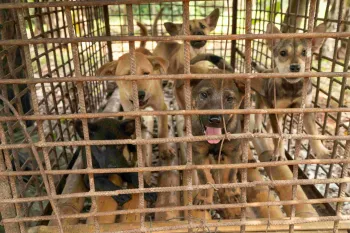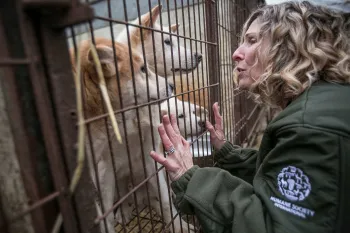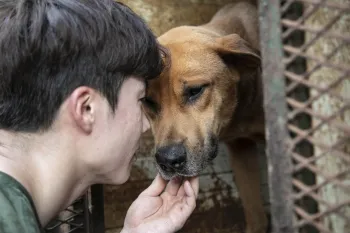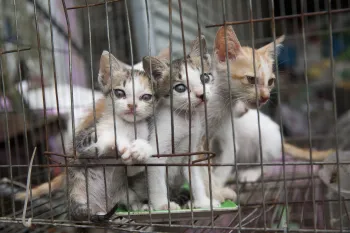When they learned there was a way out of raising puppies for sale and slaughter, two business owners in Viet Nam seized the opportunity.
For seven years, Phạm Dũng ran a puppy-fattening farm that supplied local dog meat slaughterhouses and restaurants, and it took a toll on his mind and heart. Citing the immense animal suffering caused by the dog and cat meat trade, he told our team that he is looking forward to putting this way of life behind him to grow crops instead. “Harvesting beansprouts and sweet potatoes will be a lot more peaceful than fattening puppies for slaughter, and a lot better for my mental health knowing I’m not causing any suffering.” Because he contacted our team in Viet Nam to help him transition his business to a kinder livelihood, he will no longer be complicit in the trade that kills 5 million dogs and 1 million cats each year for meat in Viet Nam.
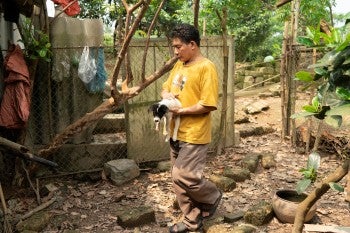
Tim Gerard Barker/AP Images for HSI
Trần Lê Hậu had been in the puppy-fattening business just three years when he decided to find a way out. Like Dũng, he contacted our team in Viet Nam to participate in our Models for Change program. To replace his puppy-fattening farm, he plans to open an agricultural supply store, selling seeds and fertilizer.
“I no longer want to be involved in the dog meat trade,” Hậu said, citing the very real threats of disease spread associated with the dog and cat meat trade. When community dogs and cats who have been vaccinated against rabies and other disease are rounded up for the dog and cat meat trade, it removes a critical barrier that helps to limit the spread of rabies. “I know about the dangers of rabies and other diseases, and I don’t want that for my family or my community.”
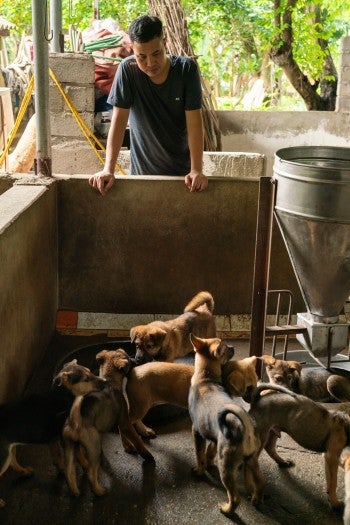
Tim Gerard Barker/AP Images for HSI
Our international colleagues have ensured that the more than 50 puppies rescued from the two fattening farms are transported to a temporary shelter at the Thai Nguyen University of Agriculture and Forestry, where they are being given the veterinary care and rehabilitation they need before being made available for local adoption.
Both puppy-fattening farms are in Thai Nguyen, known to be a hot spot for dog meat. Most dogs killed for meat in Viet Nam are stolen pets or strays snatched from the streets. Puppy-fattening farms, which rely on traders going village to village on motorbikes to exchange puppies for cooking pots or cash, represent a smaller part of the trade. However, in dog meat hot spots such as the Thai Nguyen province, puppy-fattening farms are more common. The puppies are crammed together in small cages and driven for hours to facilities like those run by Mr. Dũng and Mr. Hậu for fattening up, many suffering from dehydration, suffocation or heatstroke. Some even die during these hellish journeys.
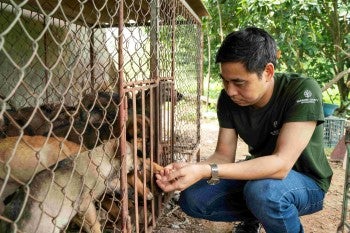
Tim Gerard Barker/AP Images for HSI
These are the fourth and fifth dog or and cat meat trade businesses in Viet Nam to permanently close under Humane Society International’s Models for Change program. We have a three-year agreement with the provincial governments of Thai Nguyen and Dong Nai, to tackle the dog and cat meat trades (including transitioning businesses away from the dog and cat meat trades), promote companion animal welfare, as well as implement rabies vaccinations and humane dog population management programs.
Most people in Viet Nam don’t eat dog meat. A 2023 Nielsen opinion poll commissioned by HSI found that around one-quarter of the population (24%) had consumed dog meat in the last year, while roughly two-thirds of respondents respectively support a ban on dog meat consumption and trade.
When we started our Models for Change work on the dog meat farms of South Korea in 2015, we were told that a ban there would be impossible. Earlier this year, following years of dedicated campaign and lobby work by HSI/Korea and other local groups, South Korea passed a law to end the dog meat industry there by 2027. Containing a similar provision to Models for Change, this law allows for people in the dog meat industry there to apply for government support to help them transition or close those businesses. We are immensely proud that our program showed policymakers that it was possible to permanently shutter facilities supporting the dog meat industry without putting people out of work, even improving their lives.
We hope that we can someday see a similar paradigm shift in Viet Nam, for the good of all members of these communities, human and animal.
You can urge Viet Nam to end these cruel trades.
Follow Kitty Block @HSUSKittyBlock.
